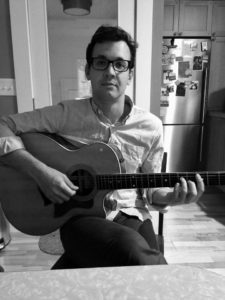By Amy Lindholm, MS, LPC
Matt Whitaker brings a wealth of experience, thoughtfulness and an ardent passion to end-of life care. In his current job as Hospice Consultant at Serenity hospice, Matt acts as a bridge between the care team and families considering hospice. He facilitates understanding of the hospice journey and the possibilities it holds for healing, joy and connection at the end of life.
 In an interview at Baker & Spice bakery, fellow new NWADEBs member Amy Lindholm spoke to Matt about the origins of his passion for his work.
In an interview at Baker & Spice bakery, fellow new NWADEBs member Amy Lindholm spoke to Matt about the origins of his passion for his work.
Your journey into end of life care has early roots. Yes! My Dad was an independent pharmacist and my Mom was a nurse. She got into end-of-life nursing through working on AIDS floor at a Emory Hospital near the CDC in Atlanta.
As I child I spent lot of time with elders: reading to them, spending time with them. My best friend in elementary school was my great granddad. I was always fascinated with his stories and perspective on things. Once I asked him, “What is greatest invention of 20th century? Without hesitating, he replied, “Your great grandmother!” I had a sense that this was what it might look like to have perspective. It was an early indicator that when we get to a certain point in life, all the things that seem important aren’t really that important and what ends up being important is the love that you share and the relationships you build.
What do you most love about your current work? I love that I have real time to spend with people, family members and clinicians. It is a rarity in healthcare to know that you have that time. Even when I was a music therapist, I was limited by the “progress” that needed to be made which sometimes limited our ability to spend the time needed to experience joy and connection! In End of life care, joy can be the goal!
Speaking of being a music therapist. do you find that your musical skills come into play in the work you do? Yes, I have found that musical communication is communication. There is a rhythm to everything. The first thing I do when I walk into a community is sit down in the piano. Typically a group forms. We spend quality time and the mood goes up. It opens up a place where we can talk!
What kind of music do you play in those settings? For most people, the music that resonates is from age 12 to 25. Often that music is spiritual music even if the person is not religious. Hymns and spiritual songs resonate with many people.
As the person who often called upon to explain hospice to a family, what are some of the misunderstandings people have and how do you address those?
People have many different preconceived ideas. Because of that, I generally try to lead and end with a simple description of what hospice is.
One of the misconceptions I address is the idea that there is no hope or that hope can only be found in getting better. I try to introduce people to the idea that hope can transform and be for different types of healing. It is a time to grieve but also a really unique opportunity when you are accompanying someone at the end of life to focus on what really matters.
Another big misunderstanding is the idea that working in hospice is a grim, awful job. It is such a conversation stopper at cocktail parties when you tell people you work in hospice. In fact, the field is filled with compassionate, joy-filled, incredible, hyper-present people. Yes the work can be draining and you need good self care. But it’s amazing. And I smile a lot at work!
What is person-centered care?
Well I prefer the term “person-directed care.” Basically, it is about making sure people are in charge of their own care and of the values needs and goals that are part of that care. End of life care should not be a conveyer belt of treatment but rather a process of carefully plotted decisions about health care and quality of life.
What role has spirituality played in your view of end of life issues?
It has played a huge role. Church is centering. I grew up in a deeply spiritual family. My grandfather was a Baptist deacon. My Dad was a Sunday school teacher and my Mom played spiritual music. I was raised to ask theological questions and engage in that way. Also, my grandmother had ALS. As I watched my grandfather take care of her, I witnessed him deconstructing and reconstructing his theology. He had a profound theology of suffering and liberation. I was interested in studying theology and have also been in the process of deconstructing and constructing my faith,. For better of for worse I have never been able to escape the questions of what it all means! I am an old soul.
If you are a member and wish to be listed as a Featured Member please email: admin@nwadebs.org
